A Round-up of 2018’s New Books in Apocalyptic and Millenarian Studies
Alastair Lockhart
Looking back over the year's books, there is an interesting variety of new titles covering a wide chronology and range of subjects in the study of apocalypticism and millenarianism, from esoteric aspects of ancient Judaism to apocalyptic themes in the contemporary climate-change debate. This round-up of 2018’s new books in the field includes titles presenting critical research and analysis with a primary focus on apocalyptic or millenarian ideas and movemenents that I believe will be of interest to our readers. The books included here are mainly written by academics working in Theology, Religious Studies, or Biblical Studies, although there are also books coming out other fields (for example, Political Sciences, History, and Spanish and Portugese). I have included authors’ current academic posts where known, and I comment briefly on the content and intentions of the publication in question. This kind of summary omits, of course, considerable aspects of each book discussed, so a link is provided to the publisher's website in each case, and a complete list with known web links is provided at the end. I would be glad to receive recommendations for titles that should be included in a round-up for 2019 (and any that have been missed from 2018); please send suggestions to alockhart@censamm.org.
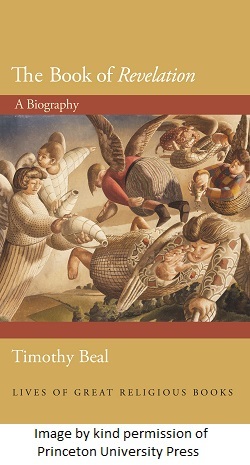 A number of books present large-scale historical or thematic introductions to aspects of the study of apocalypticism and millenarianism. The Book of Revelation: A Biography (Princeton University Press) by Timothy Beal, Professor of Religion at Case Western Reserve University, offers an account of the history of the Book of Revelation, its uses and incorporation into mystical and inspired religious visions, art and popular culture, from its origins in the first century to the present day. Another long historical approach is Jeffrey Kaplan’s Apocalypse, Revolution and Terrorism: From the Sicari to the American Revolt against the Modern World (Routledge). Kaplan, Professor of Security Studies at the King Fahd Security College, examines the shared themes of apocalypticism and religious violence within Judaism, Christianity, and Islam bridging the first century and the present day – with a methodological focus on contemporary understandings of earlier movements. Philip Ziegler’s Militant Grace: The Apocalyptic Turn and the Future of Christian Theology (Baker Academic) and John McDowell and Scott Kirkland’s Eschatology (Eerdmans) each take thematic approaches to overview accounts of their subjects. In Militant Grace Ziegler, Professor of Dogmatics at the University of Aberdeen, provides an introduction to apocalyptic theology in three parts: (1) ‘The Shape and Sources of an Apocalyptic Theology’, (2) ‘Christ, Spirit and Salvation in an Apocalyptic Key’, (3) ‘Living Faithfully at the Turn of the Ages’ – the latter taking in John Calvin, Søren Kierkegaard, and Dietrich Bonhoeffer amongst other topics. McDowell (Professor of Theology at the University of Divinity in Melbourne) and Kirkland’s (postdoctoral Research Associate at Trinity College Theological School, University of Divinity, Melbourne) shorter textbook (part of the Eerdmans Guides to Theology series) takes a history of ideas approach to the study of Christian eschatology in relation to apocalyptic, existential, political, and Christological themes.
A number of books present large-scale historical or thematic introductions to aspects of the study of apocalypticism and millenarianism. The Book of Revelation: A Biography (Princeton University Press) by Timothy Beal, Professor of Religion at Case Western Reserve University, offers an account of the history of the Book of Revelation, its uses and incorporation into mystical and inspired religious visions, art and popular culture, from its origins in the first century to the present day. Another long historical approach is Jeffrey Kaplan’s Apocalypse, Revolution and Terrorism: From the Sicari to the American Revolt against the Modern World (Routledge). Kaplan, Professor of Security Studies at the King Fahd Security College, examines the shared themes of apocalypticism and religious violence within Judaism, Christianity, and Islam bridging the first century and the present day – with a methodological focus on contemporary understandings of earlier movements. Philip Ziegler’s Militant Grace: The Apocalyptic Turn and the Future of Christian Theology (Baker Academic) and John McDowell and Scott Kirkland’s Eschatology (Eerdmans) each take thematic approaches to overview accounts of their subjects. In Militant Grace Ziegler, Professor of Dogmatics at the University of Aberdeen, provides an introduction to apocalyptic theology in three parts: (1) ‘The Shape and Sources of an Apocalyptic Theology’, (2) ‘Christ, Spirit and Salvation in an Apocalyptic Key’, (3) ‘Living Faithfully at the Turn of the Ages’ – the latter taking in John Calvin, Søren Kierkegaard, and Dietrich Bonhoeffer amongst other topics. McDowell (Professor of Theology at the University of Divinity in Melbourne) and Kirkland’s (postdoctoral Research Associate at Trinity College Theological School, University of Divinity, Melbourne) shorter textbook (part of the Eerdmans Guides to Theology series) takes a history of ideas approach to the study of Christian eschatology in relation to apocalyptic, existential, political, and Christological themes.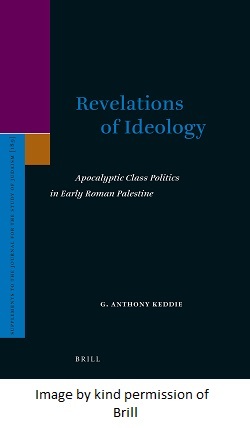 The edited volume by Nadia Al-Bagdadi (Professor of History at Central European University), David Marno (Assistant Professor of English at the University of California, Berkeley), and Matthias Riedl (Associate Professor and the head of the History Department at Central European University), The Apocalyptic Complex: Perspectives, Histories, Persistence (Central European University Press) offers a series of articles providing a mix of contemporary and historical perspectives on apocalypticism with a particular interest on divergences in thinking in American, European, and Arab contexts.
The edited volume by Nadia Al-Bagdadi (Professor of History at Central European University), David Marno (Assistant Professor of English at the University of California, Berkeley), and Matthias Riedl (Associate Professor and the head of the History Department at Central European University), The Apocalyptic Complex: Perspectives, Histories, Persistence (Central European University Press) offers a series of articles providing a mix of contemporary and historical perspectives on apocalypticism with a particular interest on divergences in thinking in American, European, and Arab contexts.
A significant area of publication is books concerned with early/second temple Judaism. Monographs in this field include Revelations of Ideology: Apocalyptic Class Politics in Early Roman Palestine (Brill) by G. Anthony Keddie, Assistant Professor of Early Christian History and Literature at the University of British Columbia, which examines the social function of Judean apocalyptic texts in early-Roman Palestine (63 BCE-70 CE). Keddie analyses apocalyptic texts as a form of class rhetoric intended to express the alignment of the scribal class with their wider community in general. Michael Stone, Professor Emeritus of Armenian Studies and Comparative Religion at the Hebrew University of Jerusalem, argues in Secret Groups in Ancient Judaism (Oxford University Press) that Jewish groups like the Qumran covenanters, Josephus's and Philo's Essenes, and Philo's Therapeutae should be understood as secret societies dedicated to the preservation and transmission of esoteric knowledge. The book suggests a new approach to the traditions that generated the Jewish apocalypses and discerns indications of other esoteric groups in ancient Jewish society.
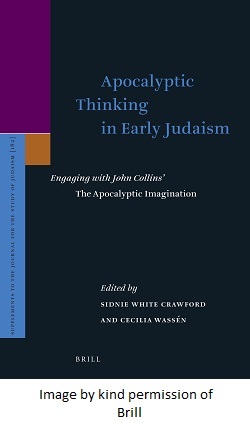 Other books in this area include three edited volumes, one looking back to the publication of John Collins’s Apocalyptic Imagination, and two emerging from the Nangeroni Meetings of the Enoch Conference. The volume edited by Cecilia Wassen (Associate Professor of New Testament at Uppsala University) and Sidnie Crawford (Professor of Classics and Religious Studies at the University of Nebraska-Lincoln), Apocalyptic Thinking in Early Judaism: Engaging with John Collins’ The Apocalyptic Imagination (Brill), offers new perspectives on apocalypticism in early Judaism in engagement with John Collins’ now classic The Apocalyptic Imagination: An Introduction to the Jewish Matrix of Christianity (1985, Crossroads). Eleven essays on current themes in the field include the editors’ introduction and a concluding response by John Collins (Holmes Professor of Old Testament Criticism and Interpretation at Yale Divinity School, and a main speaker at the forthcoming CenSAMM conference). Another volume of essays is The Seleucid and Hasmonean Periods and the Apocalyptic Worldview (Bloomsbury) edited by Lester Grabbe (Professor Emeritus of Hebrew Bible and Early Judaism at the University of Hull), Gabriele Boccaccini (Professor of Second Temple Judaism and Early Rabbinic Literature at the University of Michigan) and Jason Zurawski (PhD candidate in Second Temple Judaism at the University of Michigan). The collection is drawn from papers presented at the Nangeroni Meetings of the Enoch Conference in 2012, initiated with the intention of bringing an historical and sociological focus to the field, and it offers a focussed set of essays providing perspectives on the apocalyptic worldview and its relationship to historical events around the time of the Maccabean revolt.
Other books in this area include three edited volumes, one looking back to the publication of John Collins’s Apocalyptic Imagination, and two emerging from the Nangeroni Meetings of the Enoch Conference. The volume edited by Cecilia Wassen (Associate Professor of New Testament at Uppsala University) and Sidnie Crawford (Professor of Classics and Religious Studies at the University of Nebraska-Lincoln), Apocalyptic Thinking in Early Judaism: Engaging with John Collins’ The Apocalyptic Imagination (Brill), offers new perspectives on apocalypticism in early Judaism in engagement with John Collins’ now classic The Apocalyptic Imagination: An Introduction to the Jewish Matrix of Christianity (1985, Crossroads). Eleven essays on current themes in the field include the editors’ introduction and a concluding response by John Collins (Holmes Professor of Old Testament Criticism and Interpretation at Yale Divinity School, and a main speaker at the forthcoming CenSAMM conference). Another volume of essays is The Seleucid and Hasmonean Periods and the Apocalyptic Worldview (Bloomsbury) edited by Lester Grabbe (Professor Emeritus of Hebrew Bible and Early Judaism at the University of Hull), Gabriele Boccaccini (Professor of Second Temple Judaism and Early Rabbinic Literature at the University of Michigan) and Jason Zurawski (PhD candidate in Second Temple Judaism at the University of Michigan). The collection is drawn from papers presented at the Nangeroni Meetings of the Enoch Conference in 2012, initiated with the intention of bringing an historical and sociological focus to the field, and it offers a focussed set of essays providing perspectives on the apocalyptic worldview and its relationship to historical events around the time of the Maccabean revolt.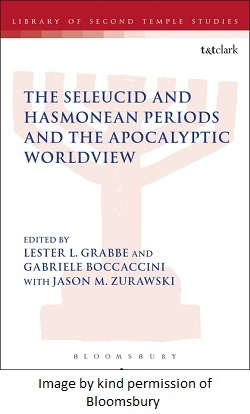 Three main papers, on ‘Understanding the relationship between the apocalyptic worldview and Jewish sectarian violence: the case of the war between Alexander Jannaeus and Demetrius III’ (Kenneth Atkinson, Professor of History, University of Northern Iowa), ‘Was the Maccabean revolt an apocalyptic movement?’ (Gerbern Oegema, Professor of Biblical Studies, McGill University), and ‘Apocalyptic worldviews – what are they and how are they spread: insights from the social sciences’ (Anathea Portier-Young, Associate Professor of Old Testament at Duke Divinity School), are accompanied by two responses each from a range of writers and an overall response, and each of the seven short papers incudes a response. Also emerging from the Nangeroni Meetings (2016), and marking a transition from books with a focus on early-Judaism to those with an emphasis on early Christianity, Benjamin Reynolds (Associate Professor of New Testament, Tyndale University College, Toronto) and Gabriele Boccaccini’s (Professor of Second Temple Judaism and Early Rabbinic Literature at the University of Michigan) edited volume Reading the Gospel of John’s Christology as Jewish Messianism: Royal, Prophetic, and Divine Messiahs (Brill) examines the Jesus represented in John’s Gospel from the perspective of Jewish messianic expectations. In addition to an introduction and epilogue by Reynolds, the volume includes 16 essays organised into the three categories (Royal Messiah, Prophetic Messiah, and Divine Messiah) and under theoretical and interpretive headings.
Three main papers, on ‘Understanding the relationship between the apocalyptic worldview and Jewish sectarian violence: the case of the war between Alexander Jannaeus and Demetrius III’ (Kenneth Atkinson, Professor of History, University of Northern Iowa), ‘Was the Maccabean revolt an apocalyptic movement?’ (Gerbern Oegema, Professor of Biblical Studies, McGill University), and ‘Apocalyptic worldviews – what are they and how are they spread: insights from the social sciences’ (Anathea Portier-Young, Associate Professor of Old Testament at Duke Divinity School), are accompanied by two responses each from a range of writers and an overall response, and each of the seven short papers incudes a response. Also emerging from the Nangeroni Meetings (2016), and marking a transition from books with a focus on early-Judaism to those with an emphasis on early Christianity, Benjamin Reynolds (Associate Professor of New Testament, Tyndale University College, Toronto) and Gabriele Boccaccini’s (Professor of Second Temple Judaism and Early Rabbinic Literature at the University of Michigan) edited volume Reading the Gospel of John’s Christology as Jewish Messianism: Royal, Prophetic, and Divine Messiahs (Brill) examines the Jesus represented in John’s Gospel from the perspective of Jewish messianic expectations. In addition to an introduction and epilogue by Reynolds, the volume includes 16 essays organised into the three categories (Royal Messiah, Prophetic Messiah, and Divine Messiah) and under theoretical and interpretive headings.
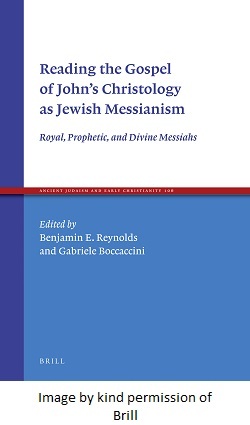 One of the largest areas of publication in 2018 was books with a focus on apocalyptic themes in early Christianity and the New Testament – with a preponderance of books focussing on the apostle Paul. Of the books taking the text of the book of Revelation as their subject, Studies in the History of the Greek Text of the Apocalypse: The Ancient Stems (SBL Press) offers a new translation of the classic work, Studien zur Geschichte des Griechischen Apokalypse-Textes, (1955, Zink) by Josef Schmid (1883-1975) Professor of New Testament and Hermeneutics at the Ludwig Maximilians University in Munich. The translation is prepared by Juan Hernández Jr. (Professor of New Testament and Early Christianity at Bethel University in St. Paul, Minnesota), Garrick Allen (Lecturer in New Testament at Dublin City University and Research Associate of the School of Ancient Languages, University of Pretoria) and Darius Müller (researcher at the Institut für Septuaginta und biblische Textforschung at the Kirchliche Hochschule Wuppertal/Bethel). The other publication with a focus on Revelation is Paul Middleton’s The Violence of the Lamb: Martyrs as Agents of Divine Judgement in the Book of Revelation (Bloomsbury) which seeks to emphasise the themes of martyrdom and violence in the Book of Revelation. Middleton, Professor of New Testament and Early Christianity at the University of Chester, proposes that martyrdom in the book of Revelation is a call to direct participation in violence against God’s enemies, rather than an exemplification of non-violent resistance. Three books focussing on the apostle Paul draw attention to his apocalyptic thinking and its relationship to the wider cultures within which he moved. James Davies, Tutor in New Testament at Trinity College, Bristol, published Paul Among the Apocalypses? An Evaluation of the ‘Apocalyptic Paul’ in the Context of Jewish and Christian Apocalyptic Literature (Bloomsbury; a related video presentation is available here).
One of the largest areas of publication in 2018 was books with a focus on apocalyptic themes in early Christianity and the New Testament – with a preponderance of books focussing on the apostle Paul. Of the books taking the text of the book of Revelation as their subject, Studies in the History of the Greek Text of the Apocalypse: The Ancient Stems (SBL Press) offers a new translation of the classic work, Studien zur Geschichte des Griechischen Apokalypse-Textes, (1955, Zink) by Josef Schmid (1883-1975) Professor of New Testament and Hermeneutics at the Ludwig Maximilians University in Munich. The translation is prepared by Juan Hernández Jr. (Professor of New Testament and Early Christianity at Bethel University in St. Paul, Minnesota), Garrick Allen (Lecturer in New Testament at Dublin City University and Research Associate of the School of Ancient Languages, University of Pretoria) and Darius Müller (researcher at the Institut für Septuaginta und biblische Textforschung at the Kirchliche Hochschule Wuppertal/Bethel). The other publication with a focus on Revelation is Paul Middleton’s The Violence of the Lamb: Martyrs as Agents of Divine Judgement in the Book of Revelation (Bloomsbury) which seeks to emphasise the themes of martyrdom and violence in the Book of Revelation. Middleton, Professor of New Testament and Early Christianity at the University of Chester, proposes that martyrdom in the book of Revelation is a call to direct participation in violence against God’s enemies, rather than an exemplification of non-violent resistance. Three books focussing on the apostle Paul draw attention to his apocalyptic thinking and its relationship to the wider cultures within which he moved. James Davies, Tutor in New Testament at Trinity College, Bristol, published Paul Among the Apocalypses? An Evaluation of the ‘Apocalyptic Paul’ in the Context of Jewish and Christian Apocalyptic Literature (Bloomsbury; a related video presentation is available here). 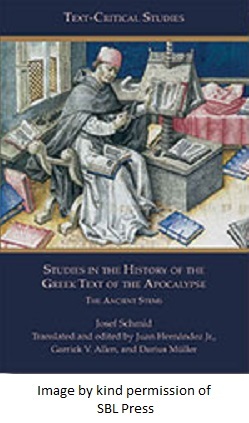 Davies examines Paul’s theology as an expression of Jewish and Christian apocalyptic literature of his time. Paula Fredriksen’s Paul: The Pagans’ Apostle (Yale University Press; a related video presentation available here) offers an account of the apostle that highlights his pagan context. Fredriksen, Professor of Scripture emerita at Boston University and faculty member of the Hebrew University, seeks to bring out the complexity and dynamism of the relationship between Paul’s apocalyptic expectation and his pagan context. Finally, Emma Wasserman, Associate Professor of Religion at Rutgers University, offers Apocalypse as Holy War: Divine Politics and Polemics in the Letters of Paul (Yale University Press) which responds to interpretations of apocalypticism as apologetic formulations of Christ’s victory, and reinterprets Paul’s apocalyptic texts as the expression of a vision of a unified cosmic kingdom. Taking a distinctive methodological approach compared to the other books in the New Testament/early-Christianity cluster examined here, Lynne Moss Bahr’s “The Time is Fulfilled”: Jesus’s Apocalypticism in the Context of Continental Philosophy (Bloomsbury) applies insight from continental philosophy on the messianic to the temporality of Jesus’s proclamation of the Kingdom of God to examine the relationship between God and humanity. In a similar vein, Biblical Animality after Jacques Derrida (SBL Press) by Hannah Strømmen, Senior Lecturer in Biblical Studies at the University of Chichester, uses Derrida to critique the boundary between humans and animals in the Bible, culminating with an assessment of the ‘Bodies of the Beast’ in the book of Revelation.
Davies examines Paul’s theology as an expression of Jewish and Christian apocalyptic literature of his time. Paula Fredriksen’s Paul: The Pagans’ Apostle (Yale University Press; a related video presentation available here) offers an account of the apostle that highlights his pagan context. Fredriksen, Professor of Scripture emerita at Boston University and faculty member of the Hebrew University, seeks to bring out the complexity and dynamism of the relationship between Paul’s apocalyptic expectation and his pagan context. Finally, Emma Wasserman, Associate Professor of Religion at Rutgers University, offers Apocalypse as Holy War: Divine Politics and Polemics in the Letters of Paul (Yale University Press) which responds to interpretations of apocalypticism as apologetic formulations of Christ’s victory, and reinterprets Paul’s apocalyptic texts as the expression of a vision of a unified cosmic kingdom. Taking a distinctive methodological approach compared to the other books in the New Testament/early-Christianity cluster examined here, Lynne Moss Bahr’s “The Time is Fulfilled”: Jesus’s Apocalypticism in the Context of Continental Philosophy (Bloomsbury) applies insight from continental philosophy on the messianic to the temporality of Jesus’s proclamation of the Kingdom of God to examine the relationship between God and humanity. In a similar vein, Biblical Animality after Jacques Derrida (SBL Press) by Hannah Strømmen, Senior Lecturer in Biblical Studies at the University of Chichester, uses Derrida to critique the boundary between humans and animals in the Bible, culminating with an assessment of the ‘Bodies of the Beast’ in the book of Revelation.
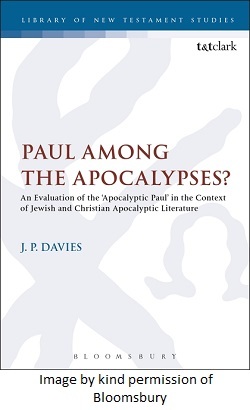 Of the books published during the year with a chronological focus in late-antiquity and into the Middle Ages, two books analyse apocalyptic themes in relation to the emergence of Islam. Professor of Religious Studies at the University of Oregon, Stephen Shoemaker’s The Apocalypse of Empire: Imperial Eschatology in Late Antiquity and Early Islam (University of Pennsylvania Press) examines the political eschatologies of early Byzantine Christianity, Judaism and Sasanian Zoroastrianism in the period of the emergence of Islam and links the Qur’an’s representation of the end of the world with the urge to imperial expansion of Muhammad and his followers. And Daniel Beck, civil litigation counsel for the United States Attorney’s Office, who holds a Juris Doctorate degree from Yale Law School where his research interests concentrated on religious law in Antiquity, presents, in Evolution of the Early Qur’ān: From Anonymous Apocalypse to Charismatic Prophet (Peter Lang), the apocalyptic context of the earliest surahs and offers a new approach to interpreting this phase of the early evolution of Islam. Two other books within the late-antiquity chronology examine aspects of apocalypticism in relation to Christian life and thought. Matthew Gabriele (Associate Professor and Coordinator of Medieval and Early Modern Studies in the Department of Religion and Culture at Virginia Tech) and James Palmer (Reader in Medieval History at St Andrews) edit the volume Apocalypse and Reform from Late Antiquity to the Middle Ages (Routledge) which offers a series of essays presenting examinations of the implications of apocalypticism, understood as a mainstream cultural force, in the formation of Medieval Europe. The chapters stretch chronologically from ‘The Chronicle of Hydatius: A historical guidebook to the last days of the western Roman Empire’ by Veronika Wieser (Lecturer in Medieval History at the University of Vienna) to ‘Against the silence: Twelfth-century Augustinian reformers confront apocalypse’ by Jehangir Yezdi Malegam (Associate Professor of History at Duke University). The editors contribute chapters on ‘To be found prepared: Eschatology and reform rhetoric ca. 570-ca. 640’ (Palmer) and ‘This time. Maybe this time. Biblical commentary, monastic historiography, and lost cause-ism at the turn of the first millennium’ (Gabriele). The Donatist Church in an Apocalyptic Age (Oxford University Press) by Jesse Hoover, Lecturer in the Department of Religion at Baylor University, examines the Donatists, briefly the majority church in Roman North Africa before they dissipated around the 6th century, to uncover the apocalyptic themes in their surviving writings.
Of the books published during the year with a chronological focus in late-antiquity and into the Middle Ages, two books analyse apocalyptic themes in relation to the emergence of Islam. Professor of Religious Studies at the University of Oregon, Stephen Shoemaker’s The Apocalypse of Empire: Imperial Eschatology in Late Antiquity and Early Islam (University of Pennsylvania Press) examines the political eschatologies of early Byzantine Christianity, Judaism and Sasanian Zoroastrianism in the period of the emergence of Islam and links the Qur’an’s representation of the end of the world with the urge to imperial expansion of Muhammad and his followers. And Daniel Beck, civil litigation counsel for the United States Attorney’s Office, who holds a Juris Doctorate degree from Yale Law School where his research interests concentrated on religious law in Antiquity, presents, in Evolution of the Early Qur’ān: From Anonymous Apocalypse to Charismatic Prophet (Peter Lang), the apocalyptic context of the earliest surahs and offers a new approach to interpreting this phase of the early evolution of Islam. Two other books within the late-antiquity chronology examine aspects of apocalypticism in relation to Christian life and thought. Matthew Gabriele (Associate Professor and Coordinator of Medieval and Early Modern Studies in the Department of Religion and Culture at Virginia Tech) and James Palmer (Reader in Medieval History at St Andrews) edit the volume Apocalypse and Reform from Late Antiquity to the Middle Ages (Routledge) which offers a series of essays presenting examinations of the implications of apocalypticism, understood as a mainstream cultural force, in the formation of Medieval Europe. The chapters stretch chronologically from ‘The Chronicle of Hydatius: A historical guidebook to the last days of the western Roman Empire’ by Veronika Wieser (Lecturer in Medieval History at the University of Vienna) to ‘Against the silence: Twelfth-century Augustinian reformers confront apocalypse’ by Jehangir Yezdi Malegam (Associate Professor of History at Duke University). The editors contribute chapters on ‘To be found prepared: Eschatology and reform rhetoric ca. 570-ca. 640’ (Palmer) and ‘This time. Maybe this time. Biblical commentary, monastic historiography, and lost cause-ism at the turn of the first millennium’ (Gabriele). The Donatist Church in an Apocalyptic Age (Oxford University Press) by Jesse Hoover, Lecturer in the Department of Religion at Baylor University, examines the Donatists, briefly the majority church in Roman North Africa before they dissipated around the 6th century, to uncover the apocalyptic themes in their surviving writings.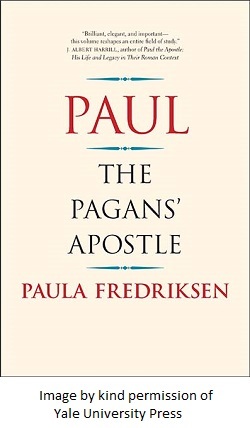 Richard Emmerson, Visiting Distinguished Professor of Art History at Florida State University and Dean Emeritus of Liberal Arts, Manhattan College, marks the transition from late antiquity through the Middle Ages with his Apocalypse Illuminated: The Visual Exegesis of Revelation in Medieval Illustrated Manuscripts (Penn State University Press). The book examines twenty-five illustrated manuscripts of the book of Revelation from the 9th to the 15th centuries, assessing how they depict the themes of the text, and the nature of their interpretations. A collected volume edited by Thomas Izbicki (Humanities Librarian Emeritus at Rutgers University), Jason Aleksander (Professor of Philosophy at San José State University) and Donald Duclow (Professor of Philosophy Emeritus at Gwynedd Mercy University and Visiting Scholar in Religious Studies at the University of Pennsylvania), Nicholas of Cusa and Times of Transition: Essays in Honor of Gerald Christianson (Brill) examines Nicholas of Cusa in his context and his later reception. Published in honour of Gerald Christianson, Professor Emeritus of Church History, United Lutheran Seminary, Gettysburg, Pennsylvania, the volume is in two parts looking at institutional issues and theological and philosophical themes – the latter including articles on ‘Neoplatonic precursors to Cusanus’ conception of “non-temporal time”’ (Elizabeth Brient, Associate Professor in the Department of Philosophy at the University of Georgia), ‘Apocalylpticism and church reform’ (Richard Serina, teacher of religion at Concordia College New York), and ‘The conjecture on the last days’ (Bernard McGinn, Professor emeritus at the Divinity School of the University of Chicago).
Richard Emmerson, Visiting Distinguished Professor of Art History at Florida State University and Dean Emeritus of Liberal Arts, Manhattan College, marks the transition from late antiquity through the Middle Ages with his Apocalypse Illuminated: The Visual Exegesis of Revelation in Medieval Illustrated Manuscripts (Penn State University Press). The book examines twenty-five illustrated manuscripts of the book of Revelation from the 9th to the 15th centuries, assessing how they depict the themes of the text, and the nature of their interpretations. A collected volume edited by Thomas Izbicki (Humanities Librarian Emeritus at Rutgers University), Jason Aleksander (Professor of Philosophy at San José State University) and Donald Duclow (Professor of Philosophy Emeritus at Gwynedd Mercy University and Visiting Scholar in Religious Studies at the University of Pennsylvania), Nicholas of Cusa and Times of Transition: Essays in Honor of Gerald Christianson (Brill) examines Nicholas of Cusa in his context and his later reception. Published in honour of Gerald Christianson, Professor Emeritus of Church History, United Lutheran Seminary, Gettysburg, Pennsylvania, the volume is in two parts looking at institutional issues and theological and philosophical themes – the latter including articles on ‘Neoplatonic precursors to Cusanus’ conception of “non-temporal time”’ (Elizabeth Brient, Associate Professor in the Department of Philosophy at the University of Georgia), ‘Apocalylpticism and church reform’ (Richard Serina, teacher of religion at Concordia College New York), and ‘The conjecture on the last days’ (Bernard McGinn, Professor emeritus at the Divinity School of the University of Chicago).
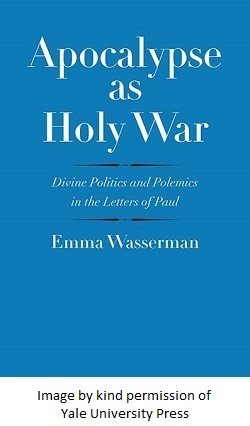 Three of the books with a Medieval chronological focus provide an insight into the social and religious mind-set of the period. Michael D. Barbezat, Honorary Research Fellow at the University of Western Australia, examines the ideas behind the burning alive of Christian heretics in the Middle Ages in Burning Bodies: Communities, Eschatology, and the Punishment of Heresy in the Middle Ages (Cornell University Press). The book links the burnings to wider discourses of community and eschatology seeking to uncover what the burnings meant in terms of the religious and social cultures of the time. Nelly Ficzel’s Der Papst als Antichrist: Kirchenkritik und Apokalyptik im 13. und frühen 14. Jahrhundert (Brill) provides an analysis of the idea of the apocalylptic enemy in the 13th and 14th centuries. The central narrative examined by the book is the notion that the highest ecclesiastical offices were to be taken over by evil at the end of time. Vincent Robert-Nicoud’s The World Upside Down in 16th-Century French Literature and Visual Culture (Brill/Rodopi) takes an interdisciplinary approach to the topos of the world upside down in early Modern French culture as means to examine the ways in which social, political, and religious turmoil of the time was understood – including in terms of the relationship between social and cosmic disorder and apocalyptic themes.
Three of the books with a Medieval chronological focus provide an insight into the social and religious mind-set of the period. Michael D. Barbezat, Honorary Research Fellow at the University of Western Australia, examines the ideas behind the burning alive of Christian heretics in the Middle Ages in Burning Bodies: Communities, Eschatology, and the Punishment of Heresy in the Middle Ages (Cornell University Press). The book links the burnings to wider discourses of community and eschatology seeking to uncover what the burnings meant in terms of the religious and social cultures of the time. Nelly Ficzel’s Der Papst als Antichrist: Kirchenkritik und Apokalyptik im 13. und frühen 14. Jahrhundert (Brill) provides an analysis of the idea of the apocalylptic enemy in the 13th and 14th centuries. The central narrative examined by the book is the notion that the highest ecclesiastical offices were to be taken over by evil at the end of time. Vincent Robert-Nicoud’s The World Upside Down in 16th-Century French Literature and Visual Culture (Brill/Rodopi) takes an interdisciplinary approach to the topos of the world upside down in early Modern French culture as means to examine the ways in which social, political, and religious turmoil of the time was understood – including in terms of the relationship between social and cosmic disorder and apocalyptic themes.
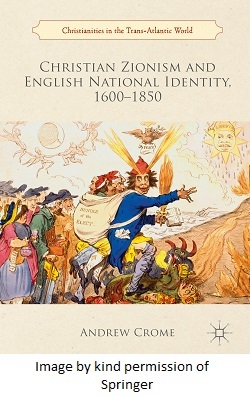 Alison McQueen’s Political Realism in Apocalyptic Times (Cambridge University Press; a related video presentation is available here) does not take a primarily theological or religious studies approach to the apocalyptic theme (McQueen is Assistant Professor in the Department of Political Science at Stanford University), however the historical and philosophical approach is likely to be of interest to those approaching the subject from those wider perspectives. Like Kershner and Akenson’s books (discussed below), McQueen centres her account on an examination of the life and work of particular key thinkers; in this case three philosophers, Niccolò Machiavelli (1469-1527), Thomas Hobbes (1588-1679), and the political scientist Hans Morgenthau (1904-1980). In an interesting contrast to many of the books listed here, McQueen’s focus is on these thinkers’ opposition to apocalypticism and their strategies to oppose and neutralize the blandishments of the apocalyptic thinking. The study of Quaker John Woolman (1720-1772) by Jon R. Kershner, Honorary Researcher at Lancaster University, John Woolman and the Government of Christ: A Colonial Quaker's Vision for the British Atlantic World (Oxford University Press), focuses on Woolman’s abolitionism and its place in his wider theology. Kershner presents Woolman’s theology as an apocalyptic vision of a direct government by Christ, suggesting a continued influence of early Quaker apocalypticism into the 18th century. Another book, focussing on the eschatological and apocalyptic theology of a visionary nonconformist, is Donald Akenson’s study of the Plymouth Brethren evangelist, John Nelson Darby (1800-1882): Exporting the Rapture: John Nelson Darby and the Victorian Conquest of North-American Evangelicalism (Oxford University Press). Akenson, Professor of Canadian and Colonial History, Queen's University, Ontario, presents an account of the processes behind the carrying of the theology of apocalyptic millennialism from the British Isles to North America by Darby, a missionary to the USA and Canada in the 1860s and ‘70s.
Alison McQueen’s Political Realism in Apocalyptic Times (Cambridge University Press; a related video presentation is available here) does not take a primarily theological or religious studies approach to the apocalyptic theme (McQueen is Assistant Professor in the Department of Political Science at Stanford University), however the historical and philosophical approach is likely to be of interest to those approaching the subject from those wider perspectives. Like Kershner and Akenson’s books (discussed below), McQueen centres her account on an examination of the life and work of particular key thinkers; in this case three philosophers, Niccolò Machiavelli (1469-1527), Thomas Hobbes (1588-1679), and the political scientist Hans Morgenthau (1904-1980). In an interesting contrast to many of the books listed here, McQueen’s focus is on these thinkers’ opposition to apocalypticism and their strategies to oppose and neutralize the blandishments of the apocalyptic thinking. The study of Quaker John Woolman (1720-1772) by Jon R. Kershner, Honorary Researcher at Lancaster University, John Woolman and the Government of Christ: A Colonial Quaker's Vision for the British Atlantic World (Oxford University Press), focuses on Woolman’s abolitionism and its place in his wider theology. Kershner presents Woolman’s theology as an apocalyptic vision of a direct government by Christ, suggesting a continued influence of early Quaker apocalypticism into the 18th century. Another book, focussing on the eschatological and apocalyptic theology of a visionary nonconformist, is Donald Akenson’s study of the Plymouth Brethren evangelist, John Nelson Darby (1800-1882): Exporting the Rapture: John Nelson Darby and the Victorian Conquest of North-American Evangelicalism (Oxford University Press). Akenson, Professor of Canadian and Colonial History, Queen's University, Ontario, presents an account of the processes behind the carrying of the theology of apocalyptic millennialism from the British Isles to North America by Darby, a missionary to the USA and Canada in the 1860s and ‘70s.
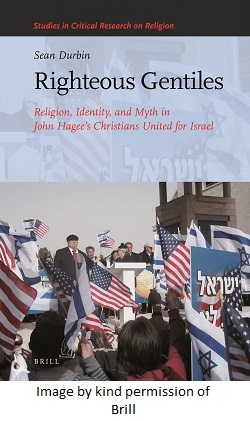 Amongst the books based in the modern or contemporary eras, an interesting subset is those dealing with aspects of Christian Zionism. Christian Zionism and English National Identity, 1600-1850 (Palgrave Macmillan) by Andrew Crome, Lecturer in Early Modern History at Manchester Metropolitan University and convener of a forthcoming CenSAMM-supported conference on Religion and Radicalism in Western Culture, examines the tradition of Zionism in English Christianity from the Whitehall Conference in 1655 up to the late-19th century and its relationship to the construction of national identity. A counterpart to Crome’s book is to be found in Samuel Goldman’s God’s Country: Christian Zionism in America (University of Pennsylvania Press) which offers an historical account of Christian Zionism in American political and religious thought from the Puritans to 9/11. Goldman, Executive Director of the Loeb Institute for Religious Freedom at the George Washington University, suggest that the political culture of the United States has been marked by a sense of its implication in the historical fate of Israel from its inception. A third book also makes Christian Zionism its central theme, with a special focus on a contemporary case study. Sean Durbin, editor of the journal Relegere, provides a critical analysis of Christians United for Israel, the largest pro-Israel organization in America in Righteous Gentiles: Religion, Identity, and Myth in John Hagee’s Christians United for Israel (Brill; a related podcast is available here). The book focuses in particular on the rhetoric and mythmaking strategies of the movement, and their use of Jews and Israel as vehicles for the representation of the movement’s truth claims. (See also, Durbin’s recent blog post for the CenSAMM website: John Hagee, Christian Zionism, and Apocalyptic Visions in the Age of Trump.)
Amongst the books based in the modern or contemporary eras, an interesting subset is those dealing with aspects of Christian Zionism. Christian Zionism and English National Identity, 1600-1850 (Palgrave Macmillan) by Andrew Crome, Lecturer in Early Modern History at Manchester Metropolitan University and convener of a forthcoming CenSAMM-supported conference on Religion and Radicalism in Western Culture, examines the tradition of Zionism in English Christianity from the Whitehall Conference in 1655 up to the late-19th century and its relationship to the construction of national identity. A counterpart to Crome’s book is to be found in Samuel Goldman’s God’s Country: Christian Zionism in America (University of Pennsylvania Press) which offers an historical account of Christian Zionism in American political and religious thought from the Puritans to 9/11. Goldman, Executive Director of the Loeb Institute for Religious Freedom at the George Washington University, suggest that the political culture of the United States has been marked by a sense of its implication in the historical fate of Israel from its inception. A third book also makes Christian Zionism its central theme, with a special focus on a contemporary case study. Sean Durbin, editor of the journal Relegere, provides a critical analysis of Christians United for Israel, the largest pro-Israel organization in America in Righteous Gentiles: Religion, Identity, and Myth in John Hagee’s Christians United for Israel (Brill; a related podcast is available here). The book focuses in particular on the rhetoric and mythmaking strategies of the movement, and their use of Jews and Israel as vehicles for the representation of the movement’s truth claims. (See also, Durbin’s recent blog post for the CenSAMM website: John Hagee, Christian Zionism, and Apocalyptic Visions in the Age of Trump.)
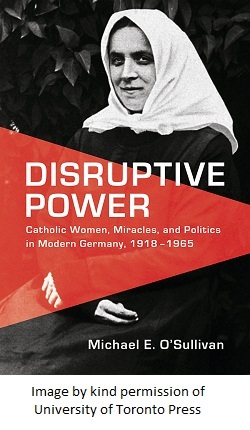 Other books examining modern and contemporary understandings of end times include a volume edited by Sigurd Bergmann, Professor of Religious Studies in the Department of Philosophy and Religious Studies at the Norwegian University of Science and Technology, Eschatology as Imagining the End: Faith Between Hope and Despair (Routledge). In the book a group of scholars from Nordic countries analyse historical and contemporary eschatological thinking from a number of different viewpoints. Bergmann’s introductory essay on ‘What images of last things do to us: Introductory remarks on why Eschatology matters’ is accompanied by articles on contemporary and recent themes in eschatology. Patrícia I. Vieira’s States of Grace: Utopia in Brazilian Culture (SUNY Press) offers an account of utopianism in Brazilian culture through examination of religious and political writings, journalism, sociological studies, and works of literature. Viera, Associate Professor of Spanish and Portuguese at Georgetown University and Associate Research Professor at the Centre for Social Studies of the University of Coimbra, reviews the link between messianic and utopian texts, and the relationship between religious, socioeconomic, political, and ecological ideas. An historical study, Disruptive Power: Catholic Women, Miracles, and Politics in Modern Germany, 1918-1965 (University of Toronto Press) by Michael O’Sullivan, Associate Professor in the Department of History at Marist College, provides an account of the stigmata of Therese Neumann of Konnersreuth and the group of followers that formed around her in the aftermath of the Great War and into the 1960s, and a number of cognate incidents and visions in rural towns after World War II.
Other books examining modern and contemporary understandings of end times include a volume edited by Sigurd Bergmann, Professor of Religious Studies in the Department of Philosophy and Religious Studies at the Norwegian University of Science and Technology, Eschatology as Imagining the End: Faith Between Hope and Despair (Routledge). In the book a group of scholars from Nordic countries analyse historical and contemporary eschatological thinking from a number of different viewpoints. Bergmann’s introductory essay on ‘What images of last things do to us: Introductory remarks on why Eschatology matters’ is accompanied by articles on contemporary and recent themes in eschatology. Patrícia I. Vieira’s States of Grace: Utopia in Brazilian Culture (SUNY Press) offers an account of utopianism in Brazilian culture through examination of religious and political writings, journalism, sociological studies, and works of literature. Viera, Associate Professor of Spanish and Portuguese at Georgetown University and Associate Research Professor at the Centre for Social Studies of the University of Coimbra, reviews the link between messianic and utopian texts, and the relationship between religious, socioeconomic, political, and ecological ideas. An historical study, Disruptive Power: Catholic Women, Miracles, and Politics in Modern Germany, 1918-1965 (University of Toronto Press) by Michael O’Sullivan, Associate Professor in the Department of History at Marist College, provides an account of the stigmata of Therese Neumann of Konnersreuth and the group of followers that formed around her in the aftermath of the Great War and into the 1960s, and a number of cognate incidents and visions in rural towns after World War II.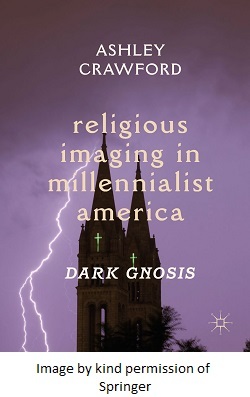 The contemporary Catholic theme is continued in Daniel Minch’s Eschatological Hermeneutics: The Theological Core of Experience and Our Hope for Salvation (Bloomsbury). Minch, postdoctoral research fellow at the Faculty of Theology and Religious Studies at Katholieke Universiteit Leuven, offers an eschatological exploration of the work of Edward Schillebeeckx (1914-2009) and its significance after the Second Vatican Council.
The contemporary Catholic theme is continued in Daniel Minch’s Eschatological Hermeneutics: The Theological Core of Experience and Our Hope for Salvation (Bloomsbury). Minch, postdoctoral research fellow at the Faculty of Theology and Religious Studies at Katholieke Universiteit Leuven, offers an eschatological exploration of the work of Edward Schillebeeckx (1914-2009) and its significance after the Second Vatican Council.
Finally, two books provide accounts of movements and ideas which have a high profile in the wider culture today. The book by freelance cultural critic, Ashley Crawford, Religious Imaging in Millennialist America: Dark Gnosis (Palgrave Macmillan) reviews the ways in which putatively religious ideas and themes are adapted and harnessed in the apparently secular work of the contemporary creative and artistic industries including an aesthetic of apocalypticism. Catherine Keller, Professor of Constructive Theology at the Theological School of Drew University, examines the relationship between climate change and contemporary political crises in the light of Carl Schmitt’s political theology of the sovereign exception in Political Theology of the Earth: Our Planetary Emergency and the Struggle for a New Public (Columbia University Press). Identifying that relationship as a secularized apocalypse, Keller calls for a broad planetary movement for social and ecological justice that crosses any opposition between the religious and the secular spheres.
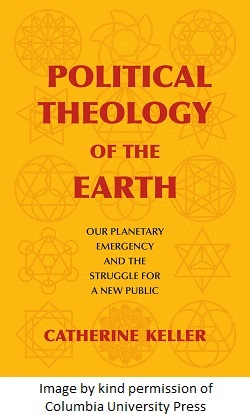 Crawford’s and Keller’s books close this round-up which includes 38 new books published on themes in the study of apocalyptic and millenarian movements during 2018. While categorising by period or theme is a somewhat contentious endeavour, it is interesting to note that the largest thematic areas appear to be books concerned with apocalyptic themes in early Christianity/the New Testament and those with a focus on late-modern/contemporary topics (seven books in each area). The relative balance of late-antiquity and the middle ages is hard to judge, as it depends on how one splits titles that overlap the broad timeframe. Nevertheless, there are nine titles in all that fall under the combined category, with two making early Islam their focus, and four or five with a firmly medieval focus. Overall, there was a healthy and interesting variety in the books published during the year.
Crawford’s and Keller’s books close this round-up which includes 38 new books published on themes in the study of apocalyptic and millenarian movements during 2018. While categorising by period or theme is a somewhat contentious endeavour, it is interesting to note that the largest thematic areas appear to be books concerned with apocalyptic themes in early Christianity/the New Testament and those with a focus on late-modern/contemporary topics (seven books in each area). The relative balance of late-antiquity and the middle ages is hard to judge, as it depends on how one splits titles that overlap the broad timeframe. Nevertheless, there are nine titles in all that fall under the combined category, with two making early Islam their focus, and four or five with a firmly medieval focus. Overall, there was a healthy and interesting variety in the books published during the year.
Books cited
Akenson, D.H. 2018. Exporting the Rapture: John Nelson Darby and the Victorian Conquest of North-American Evangelicalism. Oxford University Press. global.oup.com/academi...
Al-Bagdadi, N., D. Marno, and M. Riedl. (eds.) 2018. The Apocalyptic Complex: Perspectives, Histories, Persistence. Central European University Press. ceupress.com/book/apoca...
Bahr, L.M. 2018. “The Time is Fulfilled”: Jesus’s Apocalypticism in the Context of Continental Philosophy. (The Library of New Testament Studies.) Bloomsbury. www.bloomsbury.com/us/...
Barbezat, M.D. 2018. Burning Bodies: Communities, Eschatology, and the Punishment of Heresy in the Middle Ages. Cornell University Press. www.cornellpress.cornel...
Beal, T. 2018. The Book of Revelation: A Biography. (Lives of Great Religious Books.) Princeton University Press. press.princeton.edu/ti...
Beck, D. 2018. Evolution of the Early Qur’ān: From Anonymous Apocalypse to Charismatic Prophet. (Apocalypticism.) Peter Lang. www.peterlang.com/view...
Bergmann, S. (ed.) 2018. Eschatology as Imagining the End: Faith Between Hope and Despair. (New Critical Thinking in Religion, Theology and Biblical Studies.) Routledge. www.routledge.com/Esch...
Collins, J. 1985. The Apocalyptic Imagination: An Introduction to the Jewish Matrix of Christianity. Crossroads.
Crawford, A. 2018. Religious Imaging in Millennialist America: Dark Gnosis. Palgrave Macmillan. www.palgrave.com/la/bo...
Crome, A. 2018. Christian Zionism and English National Identity, 1600-1850. Palgrave Macmillan. www.palgrave.com/la/bo...
Davies, J.P. 2018. Paul Among the Apocalypses? An Evaluation of the ‘Apocalyptic Paul’ in the Context of Jewish and Christian Apocalyptic Literature. (The Library of New Testament Studies.) Bloomsbury. https://www.bloomsbury.com/uk/...
Durbin, S. 2018. Righteous Gentiles: Religion, Identity, and Myth in John Hagee’s Christians United for Israel. (Studies in Critical Research on Religion.) Brill. brill.com/abstract/tit...
Emmerson, R.K. 2018. Apocalypse Illuminated: The Visual Exegesis of Revelation in Medieval Illustrated Manuscripts. Penn State University Press. www.psupress.org/books...
Ficzel, N. 2018. Der Papst als Antichrist: Kirchenkritik und Apokalyptik im 13. und frühen 14. Jahrhundert. (Studies in Medieval and Reformation Traditions.) Brill. brill.com/view/title/3...
Fredriksen, P. 2018. Paul: The Pagans’ Apostle. Yale University Press. yalebooks.yale.edu/boo...
Gabriele, M. and J.T. Palmer (eds.). 2018. Apocalypse and Reform from Late Antiquity to the Middle Ages. Routledge. www.routledge.com/Apoc...
Goldman, S. 2018. God’s Country: Christian Zionism in America. University of Pennsylvania Press. www.upenn.edu/pennpress...
Grabbe, L.L., G. Boccaccini, and J.M. Zurawski (eds.). 2018. The Seleucid and Hasmonean Periods and the Apocalyptic Worldview. (The Library of Second Temple Studies.) Bloomsbury. ww.bloomsbury.com/uk/...
Hoover, J.A. 2018. The Donatist Church in an Apocalyptic Age. (Oxford Early Christian Studies.) Oxford University Press. global.oup.com/academi...
Izbicki, T., J. Aleksander and D. Duclow. 2018. Nicholas of Cusa and Times of Transition: Essays in Honor of Gerald Christianson (Studies in the History of Christian Traditions.) Brill. brill.com/view/title/3...
Kaplan, J. 2018. Apocalypse, Revolution and Terrorism: From the Sicari to the American Revolt against the Modern World. (Political Violence.) Routledge. www.routledge.com/Apoc...
Keddie, G.A. 2018. Revelations of Ideology: Apocalyptic Class Politics in Early Roman Palestine. (Supplements to the Journal for the Study of Judaism.) Brill. brill.com/abstract/tit...
Keller, C. 2018. Political Theology of the Earth: Our Planetary Emergency and the Struggle for a New Public. (Insurrections: Critical Studies in Religion, Politics, and Culture.) Columbia University Press. cup.columbia.edu/book/...
Kershner. J.R. 2018. John Woolman and the Government of Christ: A Colonial Quaker's Vision for the British Atlantic World. Oxford University Press. global.oup.com/academi...
McDowell, J. and S. Kirkland Eschatology. (Guides to Theology.) Eerdmans. www.eerdmans.com/Produ...
McQueen, A. 2018. Political Realism in Apocalyptic Times. Cambridge University Press. www.cambridge.org/gb/a...
Minch, D. 2018. Eschatological Hermeneutics: The Theological Core of Experience and Our Hope for Salvation. Bloomsbury. www.bloomsbury.com/us/...
Middleton, P. 2018. The Violence of the Lamb: Martyrs as Agents of Divine Judgement in the Book of Revelation. (The Library of New Testament Studies.) Bloomsbury. www.bloomsbury.com/uk/...
O’Sullivan , M.E. 2018. Disruptive Power: Catholic Women, Miracles, and Politics in Modern Germany, 1918-1965. (German and European Studies.) University of Toronto Press. utorontopress.com/ca/d...
Reynolds, B. and G. Boccaccini. (eds.) 2018. Reading the Gospel of John’s Christology as Jewish Messianism: Royal, Prophetic, and Divine Messiahs. (Ancient Judaism and Early Christianity.) Brill. brill.com/abstract/tit...
Robert-Nicoud, V. 2018. The World Upside Down in 16th-Century French Literature and Visual Culture. (Faux Titre.) Brill/Rodopi. brill.com/view/title/3...
Schmid, J. 2018. Studies in the History of the Greek Text of the Apocalypse: The Ancient Stems. J. Hernández Jr., G.V. Allen, and D. Müller (trans.) (Text Critical Studies.) SBL Press. secure.aidcvt.com/sbl/...
Schmid, J. 1955. Studien zur Geschichte des Griechischen Apokalypse-Textes. Zink.
Shoemaker, S.J. 2018. The Apocalypse of Empire: Imperial Eschatology in Late Antiquity and Early Islam. (Divinations: Rereading Late Ancient Religion.) University of Pennsylvania Press. www.upenn.edu/pennpress...
Stone, M.E. 2018. Secret Groups in Ancient Judaism. Oxford University Press. global.oup.com/academi...
Strømmen, H. 2018. Biblical Animality after Jacques Derrida. (Semeia Studies.) SBL Press. www.sbl-site.org/asset...
Vieira, P.I. 2018. States of Grace: Utopia in Brazilian Culture. (Latin American and Iberian Thought and Culture.) SUNY Press. www.sunypress.edu/p-653...
Wassen, C. and S.W. Crawford. 2018. Apocalyptic Thinking in Early Judaism: Engaging with John Collins’ The Apocalyptic Imagination. (Supplements to the Journal for the Study of Judaism.) Brill. brill.com/abstract/tit...
Wasserman, E. 2018. Apocalypse as Holy War: Divine Politics and Polemics in the Letters of Paul. Yale University Press. yalebooks.yale.edu/boo...
Ziegler, P.G. 2018. Militant Grace: The Apocalyptic Turn and the Future of Christian Theology. Baker Academic. bakerpublishinggroup.co...
Alastair Lockhart is Academic Co-Director of CenSAMM and Affiliated Lecturer in the Faculty of Divinity at the University of Cambridge. His new book Personal Religion and Spiritual Healing: The Panacea Society in the Twentieth Century (SUNY Press) uses the archives of the Panacea Charitable Trust to examine the religious ideas of spiritual seekers around the world from the 1920s to the 1970s.


